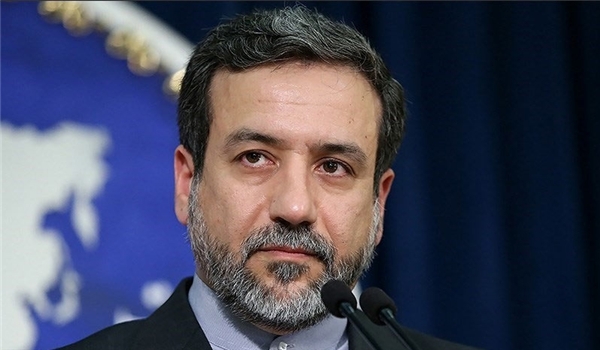 TEHRAN (FNA)- Iranian Deputy Foreign Minister Seyed Abbas Araqchi said the next round of talks between Tehran and the Group 5+1 (the US, Russia, China, Britain and France plus Germany) due to be held in Masqat, Oman, next week will be of crucial importance, and expressed the hope that the negotiations would help attainment of a final nuclear deal.
TEHRAN (FNA)- Iranian Deputy Foreign Minister Seyed Abbas Araqchi said the next round of talks between Tehran and the Group 5+1 (the US, Russia, China, Britain and France plus Germany) due to be held in Masqat, Oman, next week will be of crucial importance, and expressed the hope that the negotiations would help attainment of a final nuclear deal."I don�t think that we can reach an agreement in this round of the talks and possibly, we will need other meetings too but we hope that we can come out of the status quo and the Masqat negotiations can open the path," Araqchi said in an interview with the Iran-based Arabic-language news channel, Al-Alam, on Saturday.
Asked about media reports that certain regional issues, including the fight against the ISIL terrorist group and the challenges and threats against the region, will be raised in the Masqat talks, he said, "No. The firm decision of all of us is that no issue other than the nuclear issue will be raised between us and the G5+1."
Araqchi said that the issue of Iran's enrichment and finding a mechanism for the removal of the sanctions against Iran are the most important remaining issues which need to be solved by the two sides.
The deputy lead negotiator of the Iranian team said there has been no agreement made by the two sides over Iran's enrichment activities and the number of centrifuges.
"On the issue of sanctions, there are four channels of sanctions� and we believe that all the four should be cleared; these four channels include the UN Security Council sanctions, the EU sanctions, the US Congress sanctions and also the US President's sanctions," he added.
Araqchi further dismissed some speculations that Iran and the six powers are now thinking of a middle way as they see a final agreement now impossible and do not want to extend the Geneva Interim Agreement, saying that there are still hopes for the attainment of a final deal.
Tehran and the six powers have had seven rounds of talks in Vienna, and one more in New York and on the sidelines of the UN General Assembly. They are now preparing for their 9th round of negotiations due to be held in Masqat, Oman, on November 11.
The Geneva agreement took effect on January 20 and expired six months later on July 20. In July, Tehran and the six countries agreed to extend negotiations until November 24 after they failed to reach an agreement on a number of key issues.
In relevant remarks earlier this month, Secretary of Iran's Supreme National Security Council (SNSC) Ali Shamkhani described the removal of all sanctions against Tehran as a precondition for a comprehensive deal with the world powers, reiterating that the Iranian nation was standing firm on its nuclear rights.
"The Iranian team of negotiators with sufficient authority will make use of all initiatives to reach an agreement while preserving the country's nuclear rights," Shamkhani said in a meeting with Norwegian Foreign Minister Borge Brende in Tehran last Sunday.
He underlined that Iran's nuclear program had been fully transparent and peaceful, and within a legal framework both in the past and now.
Shamkhani reiterated that Iranians would not retreat from their nuclear rights.
The top security official, meantime, pointed to Iran's large-scale cooperation with the International Atomic Energy Agency (IAEA), and said, "The IAEA should adopt technical and legal approaches and avoid politically-driven attitudes in this regard."
By Fars News Agency
The Iran Project is not responsible for the content of quoted articles.










